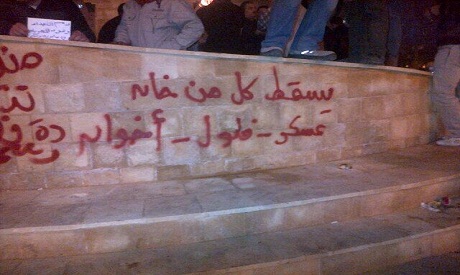 400 members of various pro-revolutionary groups have entered Tahrir Square for the first time since the ouster of Islamist president Mohamed Morsi on 3 July.
400 members of various pro-revolutionary groups have entered Tahrir Square for the first time since the ouster of Islamist president Mohamed Morsi on 3 July.
Protesters mounted a controversial memorial for protesters slain during the revolution and spray-painted slogans on the monument.
The slogans demanded retribution for "all the martyrs" and "down with the military regime," and "down with all those who betrayed the revolution: the miltary, feloul (Mubarak's people), and the Brotherhood."
The foundation for the memorial was laid on Monday morning by Prime Minister Hazem El-Beblawi.
Some revolutionaries charged that the government's move to honour martyrs was cynical since authorities are themselves to blame for the death of protesters.
Earlier this week, the interior ministry released a statement extending its condolences to the "martyrs of the revolution."
Monday evening protesters had split off from a larger event taking place in nearby Abdeen Square, commemorating the second anniversary of the Mohamed Mahmoud Street clashes between security forces and revolutionaries in November 2011, which left 47 protesters dead and hundreds injured.
Around 3,000 people attended the commemoration near the house of Gaber "Jika" Salah, who was killed during clashes that took place during the first anniversary of the Mohamed Mahmoud clashes in 2012.
The organisers of Monday's event chose the day before the actual anniversary of Mohamed Mahmoud in order to avoid clashes with security forces. Meanwhile, The anti-military, anti-Brotherhood group "The Way of the Revolution Front" plans a demonstration Tuesday in Mohamed Mahmoud Street.
Both sets of protesters have vowed not to allow Brotherhood supporters to join the commemoration or the protest in Tahrir, accusing the Islamist group of siding with the Supreme Council of the Armed Forces (SCAF) against protesters during the battle of Mohamed Mahmoud.
Activists hung a banner across the Tahrir Square-Mohamed Mahmoud Street intersection reading: "No entry for military, Feloul, Brotherhood.
Protesters chanted "No mandate for General Sisi," and "No Sisi for president."
The square has been closed to demonstrations since the ousting of president Mohamed Morsi, with two exceptions. The public were allowed to show support for army chief Abdel-Fattah El-Sisi in his efforts against terrorism on 26 July and were also allowed into the square to celebrate the 1973 war against Israel on 6 October.
An attempt by pro-Muslim Brotherhood protesters to rally in Tahrir on 1 October was thwarted by local street vendors and shop owners, who dispersed the group.
Hatem Tallima, a member of The Way of the Revolution Front, told Ahram online that Monday's entry of revolutionaries into Tahrir Square sends a message to the authorities.
"We will fight against the return of a repressive state. We are reclaiming the square of the revolution that the security forces have been occupying for four months in order to restart our long-term fight for justice," Tallima said.



